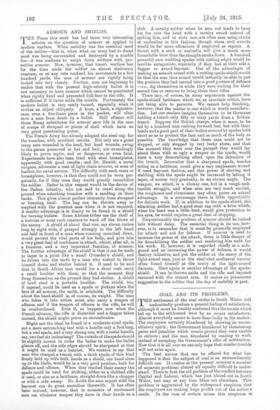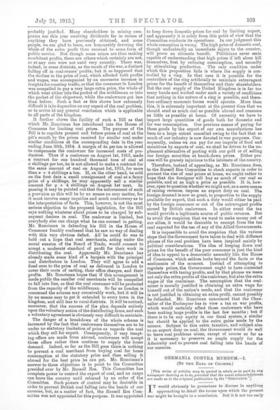COAL AND ITS PROBLEMS. T HE settlement of the coal strike
in South Wales will undoubtedly produce a general feeling of satisfaction, although it must be frankly confessed that the events which led up to the settlement were by no means satisfactory. Almost everybody seems to have done badly in the matter. The employers certainly blundered by showing an uncon- ciliatory spirit ; the Government blundered by threatening pains and penalties which events proved they were unable to enforce ; and the men blundered by ceasing to work instead of accepting the Government's offer of arbitration. Now that it is all over we can only hope that similar trouble will not arise again. The best excuse that can be offered for what has happened is that the subject of coal is an extraordinarily difficult one. It creates at the present moment a number of separate problems almost all equally difficult to under- stand. There is first the old problem of the conflict between Capital and Labour, which has just blazed out in South Wales, and may at any time blaze out elsewhere. This problem is aggravated by the widespread suspicion that the employers are making huge profits out of the nation's needs. In the case of certain mines this suspicion is probably justified. Many shareholders in mining com- panies are this year receiving dividends far in excess of anything they have previously obtained, and some people, we are glad. to learn, are honourably devoting the whole of the extra profit thus received to some form of public service. But though some mines are thus making exorbitant profits, there are others which certainly are not, or at any rate were not until very recently. There was, indeed, in some districts, as the result of the war, a distinct falling off in coalowners' profits; but it so happened that the decline in the price of coal, which affected both profits and wages, was accompanied by an enormous increase in freights for coasting traffic, so that the consumer in London was compelled to pay a very large extra price, the whole of which went either into the pocket of the middleman or into the pocket of the shipowner, while the coalowners got less than before. Such a fact as this shows how extremely difficult it is,to dogmatize on any aspect of the coal problem, or to arrive at any general conclusion which is applicable to all parts of the kingdom.
It further shows the futility of such a Bill as that which Mr. Runciman has introduced into the House of Commons for limiting coal prices. The purpose of the Bill is to regulate present and future prices of coal at the pit's mouth by the prices received for similar coal under similar conditions at the corresponding date in the year ending June 30th, 1914. A margin of 4s. per ton is allowed to compensate the coalowner for increased costs of pro- duction. Thus if a coalowner on August let, 1913, made a contract for one hundred thousand tons of coal at x shillings per ton, he is not allowed to make a contract for the same amount of coal on August 1st, 1915, for more than x + 4 shillings a ton. If, on the other hand, he sold on the first date a small consignment of coal at a fancy price of y shillings, he may apparently sell a similar amount for y + 4 shillings on August 1st next. In passing it may be pointed out that the enforcement of such a provision as this will be by no means an easy matter, for it must involve many inquiries and much controversy as to the interpretation of facts. This, however, is not the most serious objection to the proposed legislation, for the Bill says nothing whatever about prices to be charged by sub- sequent dealers in coal. The coalowner is limited, but everybody else can charge what he can succeed in getting. Mr. Runciman in defending his Bill in the House of Commons frankly confessed that he saw no way of dealing with this very obvious defect. All he could do was to hold out a hope that coal merchants, acting under the moral suasion of the Board of. Trade, would consent to accept a moderato standard of profit for their work in distributing the coal. Apparently Mr. Runciman has already made some kind of a bargain with the principal coal distributors in London. They will agree to add a fixed sum to the price of coal as delivered in London to cover their costs of carting, their office charges, and their profits. Mr. Runciman hopes that if this arrangement is made public the smaller coal merchants will be compelled to fall into line, so that the coal consumer will be protected from the rapacity of the middleman. So far as London is concerned the scheme may conceivably work, but it will be by no means easy. to get it extended to every town in the kingdom, and still less to rural districts. it will be noticed, moreover, that the success of the plan depends entirely upon the voluntary action of the distributing firms, and such a voluntary agreement is obviously very difficult to maintain.
The danger of a breakdown of the whole scheme is increased by the fact that coalowners themselves are to be under no statutory limitation of price as regards the coal which they sell for export. Consequently, if very tempt- ing offers are made from abroad, coalowners will accept those offers rather than continue to supply the home demand. Indeed, so far as the Bill goes there is nothing to prevent a coal merchant from buying coal for home consumption at the statutory price and then selling it abroad for the best price he can get. Mr, Runciman's answer to these objections is to point to the Committee presided over by Mr. Russell Rea. This Committee has complete power to control the export of coal, and no cargo can leave the country until released by an order of the Committee. Such powers of control may be desirable in order to prevent British coal falling into the hands of our enemies, but, as a matter of fact, the Russell Rea Com- mittee was not appointed for this purpose. It was appointed to keep down domestic prices for coal by limiting export, and apparently it is solely from this point of view that the Committee conducts its operations. In our judgment this whole conception is wrong. The high price of domestic coal, though undoubtedly an immediate injury to the country, will prove an ultimate benefit. Politicians never seem capable of understanding that high prices if left alone kill themselves, first by reducing consumption, and secondly bystimulating production. The only condition under which this proposition fails is whore the supply is con- trolled by a ring. In that case it is possible for the controllers of the ring artificially to maintain extravagant prices for the benefit of themselves and their shareholders. But the coal supply of the United Kingdom is in far too many bands and worked under such a variety of conditions that nothing in the nature of a ring is possible, and there- fore ordinary economic forces would operate. More than this, it is extremely important at the present time that we should send as much coal as possible abroad and consume as little as possible at home. Of necessity we have to import large quantities of goods both for domestic and for war consumption. Our previous moans of paying for these goods by the export of our own manufactures has been to a large extent cancelled owing to the fact that so much of our industry is now devoted to war purposes. Con- sequently, unless we can pay for our imports of food and munitions by exports of coal, we shall be driven to the un- pleasant alternative of parting with our gold or of selling our foreign securities at knock-down prices. Either pro- cess will be gravely injurious to the interests of the country.
Therefore, instead of appealing, as Mr. Runciman does, to the Russell Rea Committee to check exports in order to prevent the rise of coal prices at home, we ought rather to hope that the foreigner will buy as much of our coal as possible, and at as high a price as possible. It is, how- ever, open to question whether we might not, as a mere means of raising revenue, impose an export duty on coal. The foreign demand is now so great, in proportion to the supply available for export, that such a duty would either be paid by the foreign consumer or out of the extravagant profits earned by British coalowners. In either event the tax would provide a legitimate source of public revenue. But to avoid the suspicion that we want to make money out of our allies, it would be desirable to exempt from the tax coal exported for the use of any of the Allied Governments.
It is impossible to avoid the suspicion that the various steps that the Government have taken to deal with different phases of the coal problem have been inspired mainly by political considerations. The idea of keeping down coal prices for the benefit of the poor consumer is just the kind of idea to appeal to a democratic assembly like the House of Commons, which seldom looks beyond the facts or the sentiments of the moment. Instead of attempting to regulate prices, the Government ought to have contented themselves with taxing profits, and by that phrase we mean not only the extra profits of the coalowner, but also the extra wages of the coalminer. The assumption that the coal- miner is morally justified in obtaining an extra wage for himself out of the nation's needs, and that the coalowner is not justified in obtaining an extra profit, cannot possibly be defended. Mr. Runciman announced that the Chan- cellor of the Exchequer has in view a tax on war profits, which would certainly affect those coalowners who have been making large profits in the last few months ; but if there is to be any equity in our fiscal system, a similar tax should be applied to the extra gains made by the miners. Subject to this extra taxation, and subject also to an export duty on coal, the Government would do well to leave coal problems alone, except of course so far as it is necessary to preserve an ample supply for the Admiralty and to prevent coal falling into the hands of our enemies.



































 Previous page
Previous page